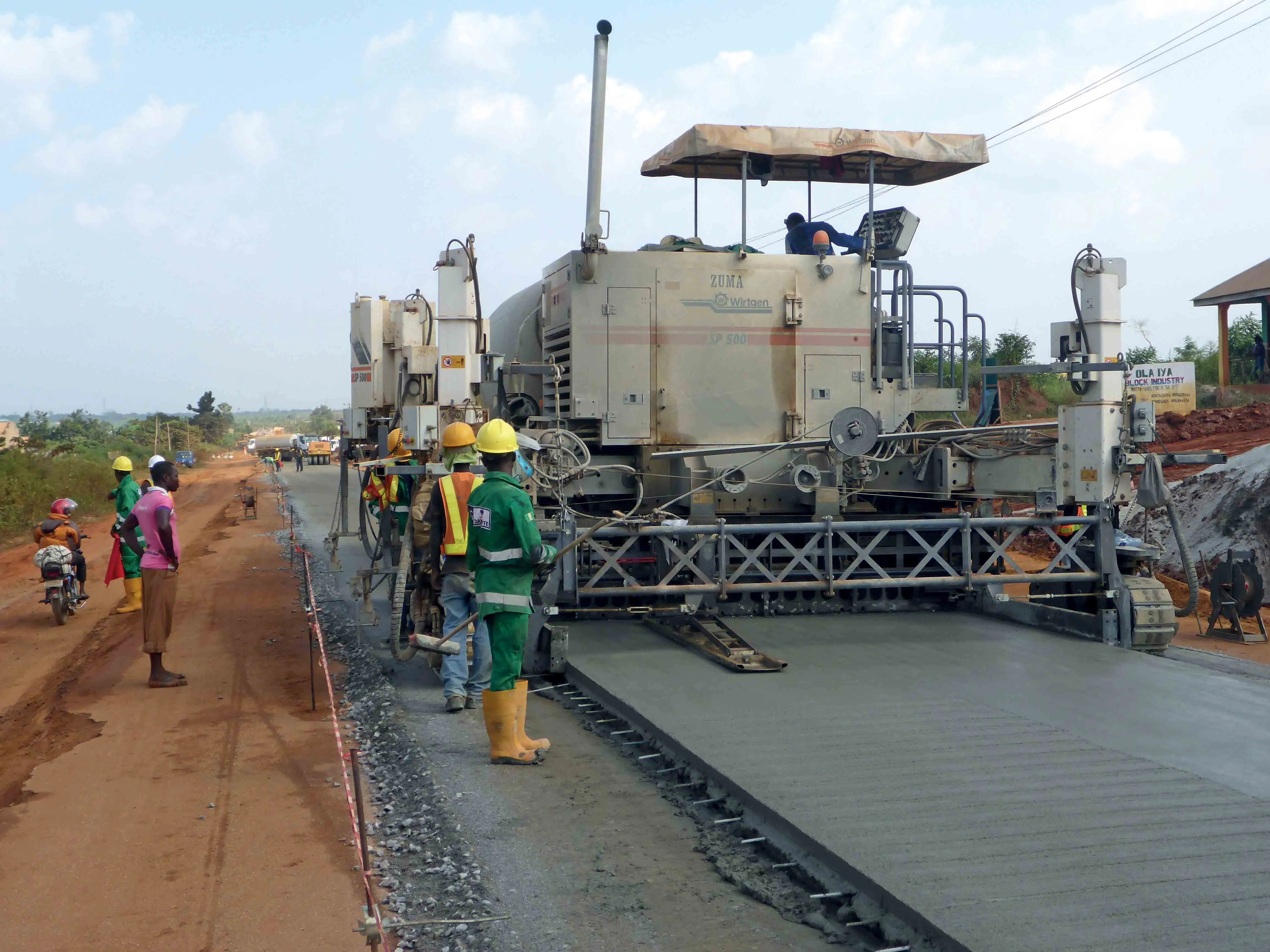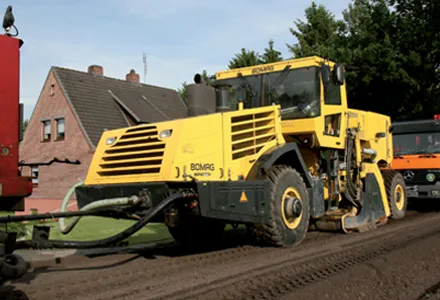A new concrete road is now open to traffic in Nigeria’s Kogi State. This is of note as the new 24km road is the now the country’s longest to be made from concrete. The new road was built in a joint venture partnership between Nigerian firm Dangote Construction and Brazilian company Andrade Gutierrez.
The new road connects Kabba with Obajana. Part of the Dangote Group, Dangote Construction was well placed to carry out the work as it operates its Obajana Cement production facility, at Obajana.
This new road
September 14, 2016
Read time: 4 mins

A new concrete road is now open to traffic in Nigeria’s Kogi State. This is of note as the new 24km road is the now the country’s longest to be made from concrete
The new road was built in a joint venture partnership between Nigerian firm8506 Dangote Construction and Brazilian company 1339 Andrade Gutierrez.
The new road connects Kabba with Obajana. Part of the Dangote Group, Dangote Construction was well placed to carry out the work as it operates its Obajana Cement production facility, at Obajana.
This new road could well set a precedent for road construction in Nigeria. The country does have a high level of seasonal rainfall, which can result in rapid wear and tear for asphalt roads. Vehicles in Nigeria are also frequently overloaded, further increasing wear rates for asphalt types roads. But concrete roads may cope better with the seasonal rainfall and may also provide a greater resistance to vehicle overloading.
Drainage is a key issue for Nigerian road construction also, as the country’s seasonal tropical rainfall can result in large volumes of rainwater being deposited in a small area in a comparatively short period of time. The performance of this stretch of road in Kogi State is likely to be watched with great interest by the road authorities in various states across the country, as well as by the Federal Government in Abuja.
Dangote explained that it opted for this method of construction as using a slipform paver offers a productive method for road building, while also delivering a uniform structure. With a cement facility close at hand, the firm says it was able to monitor and maintain concrete quality to the necessary specifications and ensure a homogenous mix was supplied to the paver. Monitoring the paver’s operation also ensured that the necessary road profile could be achieved, according to Dangote.
The construction work for the 24km stretch of road took six months, with the road lying on a base comprising a compacted laterite filling and 150mm crushed stone. The road has been constructed on top of the base structure, using a2395 Wirtgen SP 500 slipformer to pave the lanes in each direction of travel. This has required the construction of 3.65m wide by 200mm thick slabs in either direction, featuring 12mm diameter tie bars. Wirtgen’s local dealer was able to deliver training to the road construction crew from Dangote and Andrade Gutierrez, to make sure the personnel were able to make best use of the SP 500 meanwhile.
The project used around 35,000m3 of concrete, with four mixer trucks initially being used to carry the material from the plant to the slipformer and up to 15 in operation as the construction project reached its peak. After the slipforming work was carried out, expansion joints were then cut using conventional cutting equipment. Given the high temperatures Nigeria experiences, as well as the high rainfall levels in the rainy season, the expansion joints were specifically designed so as to allow sufficient expansion and contraction. These joints were also filled with a suitable material to cope with the wide temperature variations, as well as to provide efficient sealing and prevent water ingress.
According to Dangote, the firm expects the road to have a longer operating life than a comparable asphalt surface. Well-maintained concrete pavements can have a lifespan of 40 years and the country’s road authorities will be monitoring the performance of this section of road to see whether a concrete structure is suitable for Nigeria’s challenging climate. Should performance meet expectations, more concrete roads may well be built in Nigeria.
Concrete roads are comparatively rare in Africa as a whole, with the majority of surfaced roads in Africa being of asphalt construction. And the link along the coast from Ghanaian capital Accra to Tema to the east is one of the few other major routes in Africa that is made from concrete.
The new road was built in a joint venture partnership between Nigerian firm
The new road connects Kabba with Obajana. Part of the Dangote Group, Dangote Construction was well placed to carry out the work as it operates its Obajana Cement production facility, at Obajana.
This new road could well set a precedent for road construction in Nigeria. The country does have a high level of seasonal rainfall, which can result in rapid wear and tear for asphalt roads. Vehicles in Nigeria are also frequently overloaded, further increasing wear rates for asphalt types roads. But concrete roads may cope better with the seasonal rainfall and may also provide a greater resistance to vehicle overloading.
Drainage is a key issue for Nigerian road construction also, as the country’s seasonal tropical rainfall can result in large volumes of rainwater being deposited in a small area in a comparatively short period of time. The performance of this stretch of road in Kogi State is likely to be watched with great interest by the road authorities in various states across the country, as well as by the Federal Government in Abuja.
Dangote explained that it opted for this method of construction as using a slipform paver offers a productive method for road building, while also delivering a uniform structure. With a cement facility close at hand, the firm says it was able to monitor and maintain concrete quality to the necessary specifications and ensure a homogenous mix was supplied to the paver. Monitoring the paver’s operation also ensured that the necessary road profile could be achieved, according to Dangote.
The construction work for the 24km stretch of road took six months, with the road lying on a base comprising a compacted laterite filling and 150mm crushed stone. The road has been constructed on top of the base structure, using a
The project used around 35,000m3 of concrete, with four mixer trucks initially being used to carry the material from the plant to the slipformer and up to 15 in operation as the construction project reached its peak. After the slipforming work was carried out, expansion joints were then cut using conventional cutting equipment. Given the high temperatures Nigeria experiences, as well as the high rainfall levels in the rainy season, the expansion joints were specifically designed so as to allow sufficient expansion and contraction. These joints were also filled with a suitable material to cope with the wide temperature variations, as well as to provide efficient sealing and prevent water ingress.
According to Dangote, the firm expects the road to have a longer operating life than a comparable asphalt surface. Well-maintained concrete pavements can have a lifespan of 40 years and the country’s road authorities will be monitoring the performance of this section of road to see whether a concrete structure is suitable for Nigeria’s challenging climate. Should performance meet expectations, more concrete roads may well be built in Nigeria.
Concrete roads are comparatively rare in Africa as a whole, with the majority of surfaced roads in Africa being of asphalt construction. And the link along the coast from Ghanaian capital Accra to Tema to the east is one of the few other major routes in Africa that is made from concrete.







